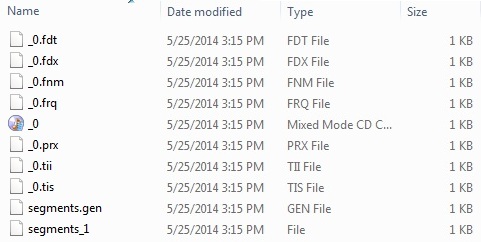Lucene更新文档操作
更新文档是另一个重要的操作,它是索引处理的一部分。此操作用于当已经索引内容被更新和索引变为无效。该操作也被称为重新编制索引。
我们更新文档包含IndexWriter字段,IndexWriter用于更新索引。
现在,我们将展示一个循序渐进的过程,以得到更新文档的理解,开始使用一个基本的例子。
更新文件的索引
-
创建更新从更新的文本文件 Lucene 文档的方法
private void updateDocument(File file) throws IOException{ Document document = new Document(); //update indexes for file contents writer.updateDocument(new Term (LuceneConstants.CONTENTS, new FileReader(file)),document); writer.close(); }
创建IndexWriter
-
IndexWriter类作为它在索引过程中创建/更新索引的核心组成部分
-
创建 IndexWriter 对象
-
创建其应指向位置,其中索引是存储一个lucene的目录
-
初始化索引目录,有标准的分析版本信息和其他所需/可选参数创建的 IndexWricrter 对象
private IndexWriter writer; public Indexer(String indexDirectoryPath) throws IOException{ //this directory will contain the indexes Directory indexDirectory = FSDirectory.open(new File(indexDirectoryPath)); //create the indexer writer = new IndexWriter(indexDirectory, new StandardAnalyzer(Version.LUCENE_36),true, IndexWriter.MaxFieldLength.UNLIMITED); }
更新文档并开始重建索引过程
下面的两个是方式更新文档。
-
updateDocument(Term, Document) - 删除包含该词条的文档,并添加使用默认的分析文档(在创建索引时,指定写入器)
-
updateDocument(Term, Document,Analyzer) - 删除包含该词条的文档,并使用提供的分析仪中添加的文件。
private void indexFile(File file) throws IOException{ System.out.println("Updating index for "+file.getCanonicalPath()); updateDocument(file); }
应用程序示例
让我们创建一个测试Lucene的应用程序来测试索引处理
| 步骤 | 描述 |
|---|---|
| 1 | 创建一个LuceneFirstApplication在包packagecom.yiibai.lucene下。也可以使用EJB创建的项目 |
| 2 | 创建LuceneConstants.java,TextFileFilter.java和Indexer.java。保持其它的文件不变。 |
| 3 | 创建 LuceneTester.java 如下所述 |
| 4 | 清理和构建应用程序,以确保按要求处理业务逻辑 |
LuceneConstants.java
这个类是用来提供可应用于示例应用程序中使用的各种常量。
package com.yiibai.lucene; public class LuceneConstants { public static final String CONTENTS="contents"; public static final String FILE_NAME="filename"; public static final String FILE_PATH="filepath"; public static final int MAX_SEARCH = 10; }
TextFileFilter.java
此类用于为.txt文件过滤器
package com.yiibai.lucene; import java.io.File; import java.io.FileFilter; public class TextFileFilter implements FileFilter { @Override public boolean accept(File pathname) { return pathname.getName().toLowerCase().endsWith(".txt"); } }
Indexer.java
这个类是用于索引的原始数据,这样我们就可以使用 Lucene 库,使其可搜索。
package com.yiibai.lucene; import java.io.File; import java.io.FileFilter; import java.io.FileReader; import java.io.IOException; import org.apache.lucene.analysis.standard.StandardAnalyzer; import org.apache.lucene.document.Document; import org.apache.lucene.document.Field; import org.apache.lucene.index.CorruptIndexException; import org.apache.lucene.index.IndexWriter; import org.apache.lucene.store.Directory; import org.apache.lucene.store.FSDirectory; import org.apache.lucene.util.Version; public class Indexer { private IndexWriter writer; public Indexer(String indexDirectoryPath) throws IOException{ //this directory will contain the indexes Directory indexDirectory = FSDirectory.open(new File(indexDirectoryPath)); //create the indexer writer = new IndexWriter(indexDirectory, new StandardAnalyzer(Version.LUCENE_36),true, IndexWriter.MaxFieldLength.UNLIMITED); } public void close() throws CorruptIndexException, IOException{ writer.close(); } private void updateDocument(File file) throws IOException{ Document document = new Document(); //update indexes for file contents writer.updateDocument( new Term(LuceneConstants.FILE_NAME, file.getName()),document); writer.close(); } private void indexFile(File file) throws IOException{ System.out.println("Updating index: "+file.getCanonicalPath()); updateDocument(file); } public int createIndex(String dataDirPath, FileFilter filter) throws IOException{ //get all files in the data directory File[] files = new File(dataDirPath).listFiles(); for (File file : files) { if(!file.isDirectory() && !file.isHidden() && file.exists() && file.canRead() && filter.accept(file) ){ indexFile(file); } } return writer.numDocs(); } }
LuceneTester.java
这个类是用来测试 Lucene 库的索引能力。
package com.yiibai.lucene; import java.io.IOException; public class LuceneTester { String indexDir = "E:\Lucene\Index"; String dataDir = "E:\Lucene\Data"; Indexer indexer; public static void main(String[] args) { LuceneTester tester; try { tester = new LuceneTester(); tester.createIndex(); } catch (IOException e) { e.printStackTrace(); } } private void createIndex() throws IOException{ indexer = new Indexer(indexDir); int numIndexed; long startTime = System.currentTimeMillis(); numIndexed = indexer.createIndex(dataDir, new TextFileFilter()); long endTime = System.currentTimeMillis(); indexer.close(); } }
数据和索引目录的创建
使用10个文件从 record1.txt 到 record10.txt 的文本文件包含简单的名称以及学生的其他细节,并把它们放在目录 E:LuceneData。这些数据用于测试。索引目录路径应创建为E:LuceneIndex。运行此程序后,就可以看到该文件夹中创建的索引文件的列表。
运行程序:
一旦创建源,创造了原始数据,数据目录和索引目录来完成,准备好这一步是编译和运行程序。要做到这一点,在LuceneTester.Java文件选项卡中使用Eclipse IDE 的Run选项,或使用Ctrl+ F11来编译和运行应用程序LuceneTester。如果应用程序一切正常,将在Eclipse IDE控制台打印以下消息:
Updating index for E:LuceneData ecord1.txt Updating index for E:LuceneData ecord10.txt Updating index for E:LuceneData ecord2.txt Updating index for E:LuceneData ecord3.txt Updating index for E:LuceneData ecord4.txt Updating index for E:LuceneData ecord5.txt Updating index for E:LuceneData ecord6.txt Updating index for E:LuceneData ecord7.txt Updating index for E:LuceneData ecord8.txt Updating index for E:LuceneData ecord9.txt 10 File indexed, time taken: 109 ms
一旦成功地运行程序,将有以下的索引目录中的内容:


